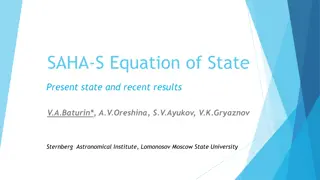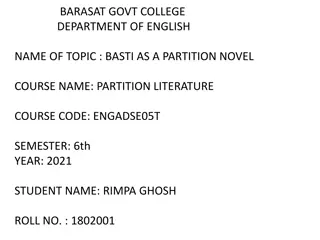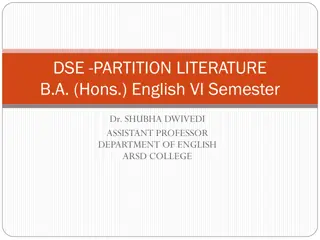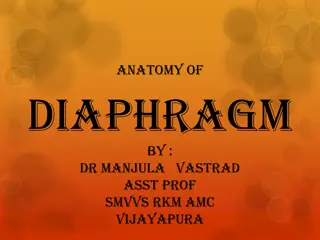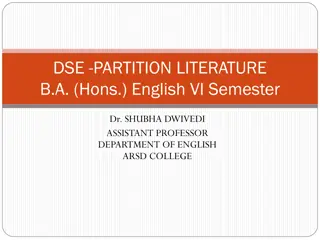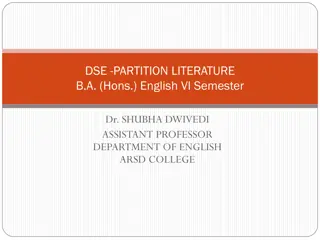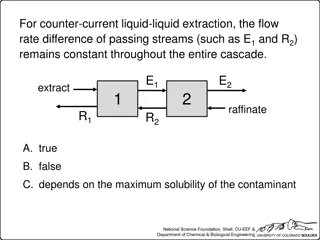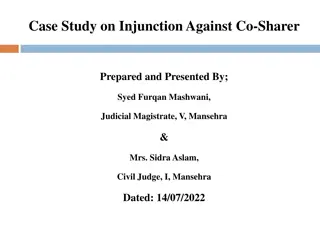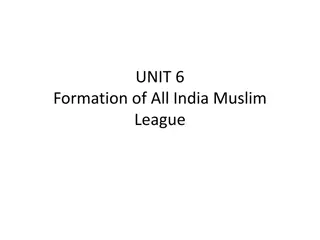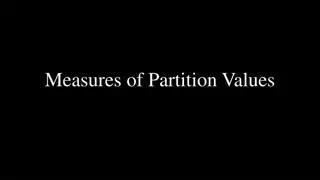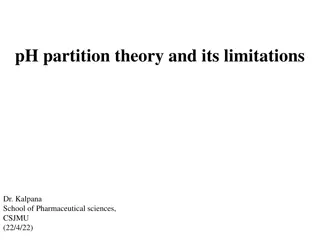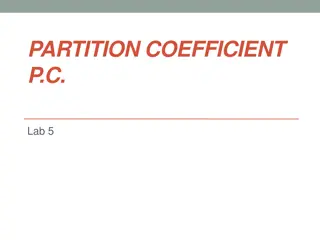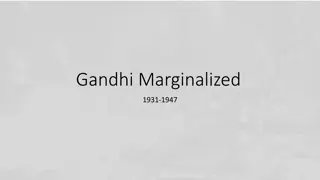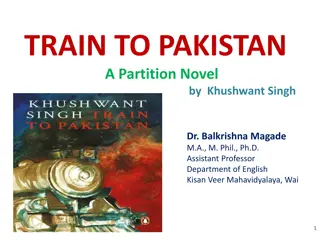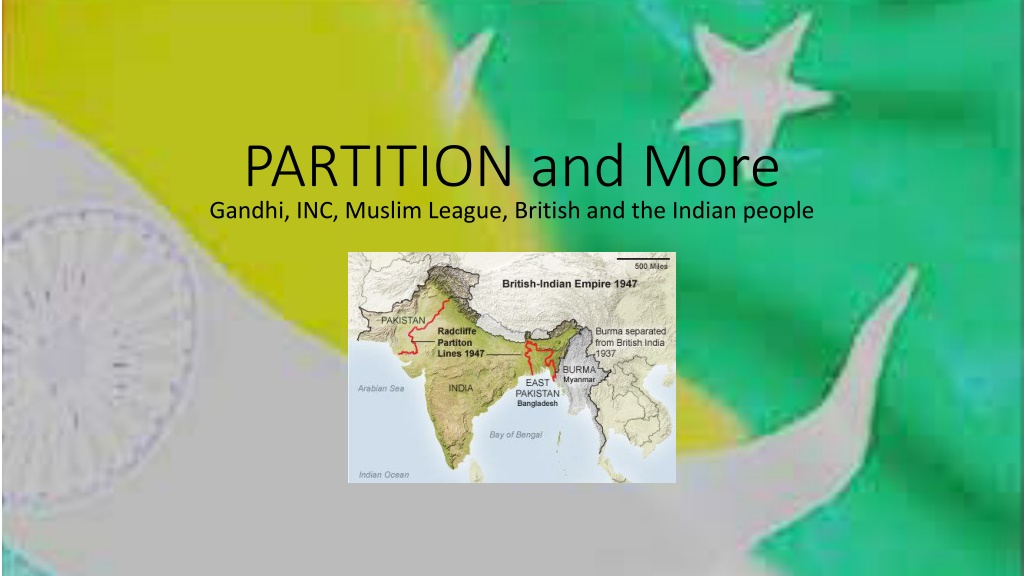
Impactful Insights into Partition of India
Discover the profound impact of the Partition of India in 1947 on politics, society, and state-building. Examining the horrors, geopolitical ramifications, and societal consequences of this momentous event sheds light on the centralization of power, minority rights, and center-state relations in contemporary India.
Download Presentation

Please find below an Image/Link to download the presentation.
The content on the website is provided AS IS for your information and personal use only. It may not be sold, licensed, or shared on other websites without obtaining consent from the author. Download presentation by click this link. If you encounter any issues during the download, it is possible that the publisher has removed the file from their server.
E N D
Presentation Transcript
PARTITION and More Gandhi, INC, Muslim League, British and the Indian people
Partition : Aug 14-15 1947 WHY study partition? Because it shapes politics, state, and society of contemporary India WHAT was it? Numbers Horrors UNDERSTANDING Partition What it was NOT High politics of Partition Popular elements IMPACT of Partition on Contemporary India Constitution Minorities Majoritarianism CENTRALIZATION of the polity (Center-State relations) Overshadow so many other critical aspects
Why Study Partition? Shaped the lives of almost a quarter of humankind Shapes geopolitics of relations between India-Pakistan-US-China today Shaped the nature of the Indian state as it emerged through the constitution of 1950 and policies adopted afterwards Centralization Language Secularism/Minority rights Center-State relations Shaped nature of Indian politics Social issues
When and How of Partition Independence and Partition come SIMULTANEOUSLY to India and Pakistan It was a decision MADE by the British rulers (in consultation with Indians) They remained in charge until August 14-15, 1947 Mountbatten was Governor General of independent India too till June 1948, wanted same role in Pakistan, Jinnah refuse Borders drawn by Sir Cyril Radcliffe (never visited India before) and kept secret until 2 days after creation of the two states
Horrors of Partition Create two nation states with new borders almost overnight Borders kept secret and not announced until two days AFTER partition Over a million people die in riots in three months Almost 11 million people forced to move from places they had lived for generations Numbers are unreliable, in all likelihood, greater than above 10-12 million refugees, in India and Pakistan, with little to no means of survival A logistical nightmare for the newly-independent states
What Partition was NOT (A Religious Divide) Not only a product of Religious PLURALITY Hindus and Muslims together since ca. 700 CE (over a thousand years) COMMUNITY is a PROJECT not a reality. Holds true for the nation too. But especially RELIGIOUS Communities. Divided by CASTE, CLASS, GENDER,REGION, and LANGUAGE among others. THINK before you use categories like The Muslims or The Hindus Who are you referring to? In the way religion is deployed in 1947, it is a product of Colonialism, and Elite (or middle class ) Indian political aims
Colonialism Nationalism and Partition British make religion central to political identity in India: a result of Orientalism (in this case, a belief that Indians irrational, religious, blind belief in religion) AND deliberate divide and rule tactics Institutions of colonial rule (laws, census, elections, and school curriculum) PREMISED on this difference and REINFORCE the production of religious identity as POLITICAL This leads to the ideology of COMMUNALISM in South Asia (that religious identity is central, paramount, of greatest concern) But Communalism not possible without INDIAN (Hindu, Muslim, others) participation or belief in that ideology Middle Class nationalist leadership (across the spectrum) found a political resource in Communalism (and British encourage this) from late 19thC In the 1930s and more 1940s this spreads to POPULAR levels too
Nationalism Majorities and Minorities Different varieties of nationalism in India by the 1930s: they imagined India in different ways Gandhi-Nehru imagination of an inclusive nation Hindu or Muslim nationalist imaginations of India in religious terms Hindu nationalists play on MAJORITY status Muslim nationalists (Muslim League) on protection of MINORITIES Inclusive nationalism insists that religion, region, or caste not the basis of an Indian identity at all At least till 1937 though, regional identities equally important
HIGH POLITICS: All About POWER (sharing it or not) Until Gandhi s marginalization, INC not cooperating with British institutions, therefore questions of majorities and minorities was moot 1935 Act and 1937 Elections, and results Muslim League s decimation and strategies Lahore Declaration ( two nations but no mention of Pakistan ) sole spokesman Local alliances in Punjab and Bengal INC arrogance No local alliances, UP informal agreement Muslim Mass contact campaign All about power, who will get what, and how
PARITION AND HIGH POLITICS Unwillingness of share power 1940 "Lahore Declaration": the demand for a separate Muslim homeland by the Muslim League Sole Spokesman Jinnah s argument that only the Muslim League could represent Indian Muslims 1945 Simla Conference. Talks breakdown as League insist that only they have right to nominate Muslim members to the council. INC elects a Muslim as party President 1945-46 Elections Cabinet Mission proposes a plan for a united India, with a weak center and relatively autonomous provincial units, grouped into one set of Hindu majority provinces and two Muslim majority ones. The closest we get to a power-sharing agreement. Direct Action Day and increasing violence. Mountbatten Plan for Partition
MOUNTBATTEN PLAN Date advanced Announced June 3, 1947 To be executed August 14/15 1947 (less than eleven weeks) Radcliffe Resources to protect Europeans Divide and Quit Horrors of Partition
IMPACT of Partition on Contemporary India Constitution Nature of the new State in independent India Center-State relations Refugee crisis in 1947 Integration of States: Kashmir Indo-Pakistan conflicts Tied up initially with the Cold War With regional players such as China Exacerbated with the secession of Bangladesh from Pakistan in 1971 (aided by India) The Place of Minorities in Indian Society and Politics The emergence of Hindu Majoritarianism as a political force
Partition and the new nation state aka India Need to ask ourselves these questions: WHAT was the NATURE of the NEW NATION STATE that was emerging after the British left? Does Partition have something do with that? TO WHAT EXTENT did the drive for a CENTRALIZED state both CAUSE PARTITION and one of its IMPACTS To what extent is the post colonial NATIONAL state a continuation of the COLONIAL state. Was this the product of A TRANSFER OF POWER rather than a REVOLUTION? Thinking about these, connects to OTHER questions _ Why was Gandhi not happy with independence celebrations? _WHO assassinated Gandhi, and WHY? _Why is there continued anger among a variety of different groups around Partition? _Why do questions remain, 75 years on, about whether Partition was necessary or not?



